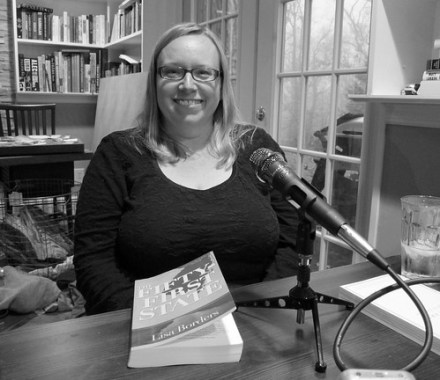Virtual Memories – season 3 episode 28 –
You Can’t Get There From Here
Podcast: Play in new window | Download
Subscribe: Spotify | TuneIn | RSS | More
“The physical landscape of south Jersey is one of the most beautiful places on earth. . . . And it’s juxtaposed with rusted-out trailers and collapsing shacks that people are still living in. There are a lot of extremes thrown together in that area. . . . It’s almost easier to explain south Jersey to people who aren’t from New Jersey than those who are.”
Lisa Borders joins the show to talk about her new novel, The Fifty-First State! It’s a fine book about mismatched half-siblings brought together by calamity, set in an area of New Jersey overlooked by most everyone but its residents. Lisa and I have a fun conversation about her work and influences, how her science background informs her writing process (she’s a part-time cytotechnologist), why form has to rise from story, how to teach novel-writing, why she stands by Jonathan Franzen’s novels, how a Michael Cunningham short story changed her life, and whether southern NJ should secede and become America’s fifty-first state.
“I don’t get why NaNoWriMo is in November. It’s Thanksgiving, it’s a short month: why not January? November is a bad, crazy month for me.”
Podcast: Play in new window | Download
Subscribe: Spotify | TuneIn | RSS | More
Enjoy the conversation! Then check out the archives for more great episodes! Related conversations:
Follow The Virtual Memories Show on iTunes, Twitter, Facebook, Tumblr, and RSS!
About our Guest
Lisa Borders grew up in central and southern New Jersey. She is the author of two novels, The Fifty-First State (Engine Books) and Cloud Cuckoo Land
(River City Publishing), chosen by Pat Conroy as the winner of River City Publishing’s Fred Bonnie Award in 2002. Cloud Cuckoo Land received fiction honors in the 2003 Massachusetts Book Awards, and was a finalist for the ForeWord Book of the Year and the Independent Publisher (IPPY) awards. Lisa’s short stories have appeared in Kalliope, Washington Square, Black Warrior Review, Painted Bride Quarterly, Newport Review and other journals, and her essay, “Enchanted Night,” was published in Don’t You Forget About Me: Contemporary Writers on the Films of John Hughes
(Simon & Schuster, 2007). She has received grants from the Massachusetts Cultural Council, the Somerville Arts Council and the Pennsylvania Council on the Arts, and fellowships at the Millay Colony, Virginia Center for the Creative Arts, Hedgebrook and the Blue Mountain Center. She wrote a really entertaining essay about her (one-sided) love affair with Michael Stipe.
Credits: This episode’s music is What If We Give It Away by R.E.M. The conversation was recorded at the Virtual Memories Estate on a pair of Blue enCORE 200 microphones feeding into a Zoom H4n recorder
. The intro and outro were recorded at home on a Blue Yeti USB Microphone
. Processing was done in Audacity and Garage Band. Photos of Lisa Borders by me.





